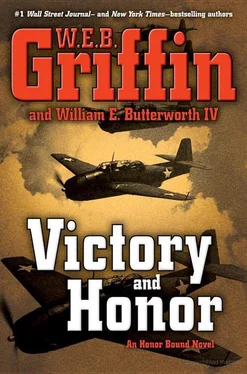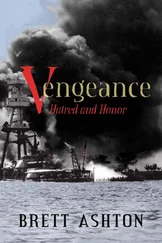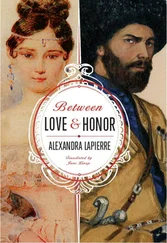Cletus went to the door and knelt to get on the ladder.
“Leave the shotgun, Enrico. And if you have a pistol, leave that, too.”
Enrico looked very unhappy.
“Or stay on the airplane,” Frade finished.
Rodríguez first took a Remington Model 11 twelve-gauge riot shotgun from where he had it suspended under his suit jacket and wrapped it in a woolen blanket on the aircraft floor.
He looked at Frade, who raised his eyebrows in question.
Rodríguez then reached under his jacket and came out with a Ballester Molina .45 ACP semiautomatic pistol, which was a variation of the 1911-A1 Colt pistol, manufactured in Argentina under license from Colt. He carefully added it to the blanket with the Remington and looked at Frade.
Frade’s eyebrows rose higher.
Rodríguez met his eyes for a moment, then shrugged. He raised the right leg of his trousers and took a snub-nosed Colt Police Positive .38 Special revolver from an ankle holster and hid it with the other weapons.
“This is America, Enrico. No one is going to shoot at us here.”
“You are the one, Don Cletus, who says that one never needs a gun until one needs it badly.”
Frade nodded, then quicky went down the rope ladder. Rodríguez followed.
On the tarmac, Frade and the welcoming committee examined each other.
Lieutenant Colonel Cletus H. Frade—one hundred ninety pounds on a trim six-foot frame—carried himself with the élan, some would say the arrogance, of a Marine fighter pilot.
The MPs—a captain, a sergeant, and a private first class—saluted when they saw his silver oak leaves. Frade returned the salute and handed the senior of the MPs a small leather wallet.
The MP captain examined it.
It contained a gold badge on one side and a sealed-in-plastic photo identification card in the other. The photo ID was clearly patterned after the Adjutant General’s Office identification cards issued to commissioned officers. There was space for a photo, a thumbprint, and the individual’s name, rank, and date of birth.
But this was not an AGO card. In its center was the Great Seal of the United States. In two curved lines at the top was the legend THE UNITED STATES OF AMERICA, and under that, OFFICE OF STRATEGIC SERVICES. A rectangular block at the bottom, with space for the individual’s name and rank, identified Cletus H. Frade as an area commander.
The credentials were not exactly bona fide—although they had been manufactured by the OSS’s Document Section. A Princeton professor of psychology with three doctoral degrees recruited into the OSS thought it would be nice if OSS operators in the field had their own credentials.
Wild Bill Donovan had lost his famous Irish temper when he’d seen them.
Absolutely unbelievable! Who the hell does this academic think OSS agents would show these? They’re spies, for christsake!
He tossed the sample credentials in his Shred and Burn wastebasket and tried to forget about them. But when Colonel A. F. Graham, his deputy director for the Western Hemisphere, showed up at his door, Donovan decided to share them for a laugh.
After inspecting them, Graham said, “May I have these, Bill?”
“You’re serious, Alec?”
“Yeah. It’s no secret in Argentina that Frade and his men are OSS. He may find a use for them. He’s resourceful.”
“He’s a damn dangerous loose cannon,” Donovan had replied, then pushed the credentials to Graham. “Get them out of here. Every time I see them, I get mad all over again.”
Graham had been right. Frade had successfully used them a few times—once to dazzle the stubborn commander of the Army Air Corps base in Brazil. When he saw Frade identified as an OSS area commander, the chickenshit had become the poster child for cooperation and goodwill. That experience had made Frade think they just might work at Washington National now.
“How may I help you, Colonel?” the MP captain, looking appropriately impressed, said.
Well, Frade thought as he took back the wallet, that worked.
So far, so good. Still on a roll . . .
“Presumably, Captain, you’re in charge of security?” Frade asked.
“Yes, sir.”
“I will be here no more than three hours,” Frade said. “I’ll be loading five passengers. Three of them may already be here. I’ll get the ones who are not. I don’t want anyone to get near my aircraft.”
“Yes, sir,” the captain said. “I understand.”
Frade gestured toward Enrico. “Sergeant Major Rodríguez here is under strict orders to keep the aircraft secure.”
Clete noticed that Enrico read between the lines—that he was going to stay with the airplane and not accompany Clete—and was both surprised and glad that Enrico did not protest being left behind.
“Yes, sir,” the captain repeated. “There won’t be any problem.”
“We didn’t get any heads-up about this,” one of the civilians, a starchy heavyset man in a cheap suit, charged in an officious tone.
“Of course you didn’t,” Frade said. “You’re from the airport, right?”
“Yes, I am.”
“We’ll require fuel, of course. And enough food for a dozen people for a ten-hour flight. In Marmite cans. You can bill that to the OSS, right?”
“I’d have to have authorization.”
“From whom?”
“From the OSS.”
“Then you just got that authorization,” Frade said. “Now, has anybody seen a chauffeur-driven 1940 Cadillac?”
“As a matter of fact,” the MP captain said, “there’s a car like that in the parking lot.”
Frade turned to the civilian from the airport.
“See what you can do about a real ladder or stairs to get up there,” he said, pointing to the Constellation’s rear door. “I’m not sure my passengers will want to climb a rope ladder.”
“I’m sure I can come up with something,” the man said.
As Clete approached the custom-bodied Cadillac, his grandfather’s chauffeur got out and opened the rear door. Tom, a silver-haired black man, had been driving Cletus Marcus Howell around Washington for as long as Clete could remember.
The Cadillac had a gasoline ration sticker affixed to its windshield. The otherwise glistening door had stripes of dull black tape on it, obviously to cover something on the door. Until that morning, the door had shown a legend required by the Office of Price Administration.
There had been gasoline rationing in the United States since early 1942, not because there was any shortage of gas but because there was a critical shortage of rubber to make tires.
A fairly complicated distribution system had been set up. At the bottom end were ordinary citizens who received two gallons of gas a week. At the top were politicians, from local mayors to members of Congress, who got all the gasoline they said they needed. Ordinary citizens got an “A” sticker, whereas congressmen and other important politicians got an “X” sticker.
In between were those who were issued “B” or “C” or “D” stickers. “B” meant the car was being driven by someone essential to the war effort; somebody driving to work in a tank factory, for example. A “B” sticker was worth eight gallons a week. “C” stickers were worth as many gallons of gas as clergymen, doctors, and “others essential to the war effort” could convince the ration board to give them. “D” was for motorcycles, which got two gallons per week.
There was a “C” on the windshield of the custom-bodied Cadillac, which was registered in the name of the Howell Petroleum Corporation. Cletus Marcus Howell was chairman of the board of Howell Petroleum, and he had been more than a little annoyed that he had to go to a ration board and beg for gas so that he could conduct the business of Howell Petroleum, whose oil wells and refineries in Texas, Louisiana, and Venezuela were turning out many millions of gallons of gasoline every day.
Читать дальше












